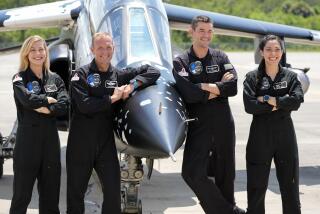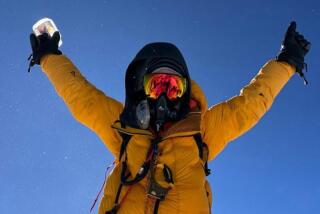NASA Focusing on Personal Space
LANDER, Wyo. — NASA astronauts are trained to cope with the isolation of a cramped space shuttle, the anxiety of takeoff and the stress of tinkering with equipment while hurtling through space.
But the National Aeronautics and Space Administration also is looking at problems that can grow out of personality quirks, such as the way a colleague organizes his personal gear in space.
Wearing backpacks instead of space suits, a group of astronauts recently spent nine days hiking the Wind River Mountains as part of a 2-year-old program that trains space explorers how to stay on each others’ good sides.
Led by guides from the Lander-based National Outdoor Leadership School, the astronauts shared cramped tents, showered with wash cloths and drank iodine-purified creek water. Their goal was to learn the tenets of leadership, cooperation and self-care, and how to recognize and respect personality differences.
For NASA, such skills are important in everything from a successful launch to a productive research mission, said Monika Schultz, NASA project manager for expeditionary training.
The skills grow increasingly important as space flights become longer and more international, NASA officials said.
“A good analogy is relatives that come to stay for few weeks to a month. Over time, the little things that didn’t bug you before now become more apparent,” Schultz said.
The August trip marked the first time that an entire crew of astronauts took the course. The seven-person crew for shuttle flight STS 107 is expected to launch a research mission on the Columbia shuttle next year, possibly as early as April.
One of the crew’s members, aerospace engineer Kalpana Chawla, an American who grew up in India, said she feels lucky to be with “a very tight crew.” Judging from the wilderness trip, personality conflicts among the crew are likely to be minimal, she said.
But Chawla said she became aware that some of her colleagues are organization-minded, like herself. At one point, one of the astronauts organized backpacking items, then another came in and reorganized them, she said.
“We were joking that this is good we’re doing this now,” she said.
The astronauts split into two teams; one was the STS 107 crew, the other consisted of another six astronauts who are awaiting mission assignments. Both teams took separate 35-mile routes across the granite and through the forest of the southern Wind River Mountains.
The wilderness experience was far from the stress of space flight, but it did pose challenges.
On the first day, under gray skies with the smell of crushed pine needles underfoot, some of the astronauts struggled to adjust to the thin air while carrying packs that weighed a third of their body weight. All had traveled from muggy Houston, where the astronaut program is based.
Their trek took them through wilderness areas of the Shoshone and Bridger-Teton national forests that feature treeless peaks in the 12,000-foot range, high mountain lakes and dense forest.
Awkwardly negotiating a bridge of loose branches and sidestepping downed trees, the STS 107 crew chatted and admired the views as they began their twisting route that crossed the Continental Divide twice and reached Wind River Peak, at 13,192 feet.
The guides led the teams for the first few days, then pulled back and allowed the teams to lead themselves with compasses and maps. Each day the astronauts chose a new leader, then evaluated their leadership ability at the end of the day.
Most of the astronauts had been hiking before, but for some, the experience was long ago.
“It’s been 20 to 30 years since I went camping,” said Koichi Wakata as he sorted his supply of food and clothing before the trip started. Wakata was the first Japanese mission specialist for NASA in 1996 on the Endeavor shuttle.
The astronauts come from mostly military and science occupations and have varied backgrounds.
The group included Israeli Air Force Col. Ilan Ramon, who fought in the Yom Kippur War of 1973, and David Brown, who was a circus acrobat in college. The astronauts’ hometowns include Ashland, Neb., Arlington, Va. and Spokane, Wash.
Besides interpersonal skills, the trips are designed to teach the astronauts a “leave no trace” philosophy in which they take care to avoid leaving food, toothpaste and trash in the wilderness where animals can find them.
Space shuttle pilot Rick Husband, who grew up in Amarillo, Texas, will be the commander of the STS 107 crew. On his first mission, in 1999, he piloted the Discovery during the first shuttle docking of the International Space Station.
Husband said the similarities between the Wyoming wilderness and space go beyond seclusion and beautiful views. As in space, there is a readjustment period, he said.
“You almost think, ‘Wow, that almost went by in a blink of an eye,’ ” he said.
More to Read
Sign up for Essential California
The most important California stories and recommendations in your inbox every morning.
You may occasionally receive promotional content from the Los Angeles Times.










